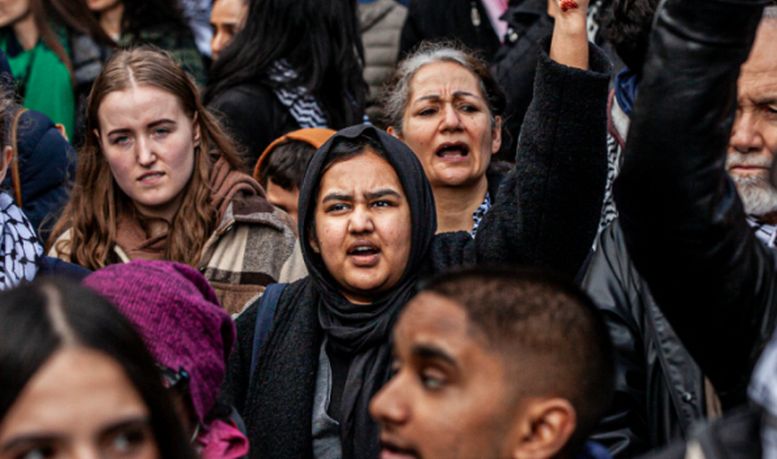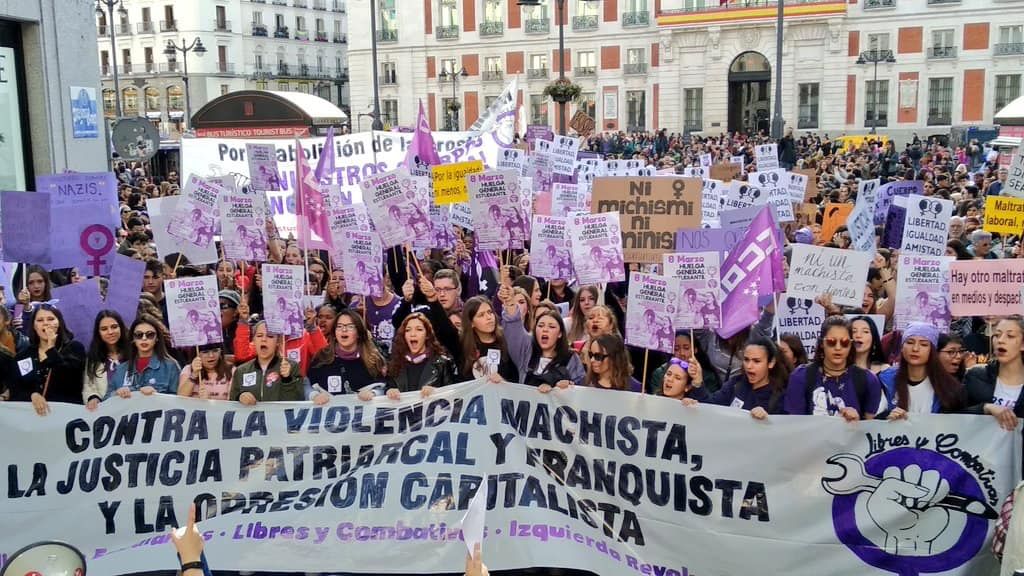International Workers’ Day greetings from ISA
Opposition to the genocidal war in Gaza will dominate this year’s demonstrations on May Day, following over six months of mass protests. With an attack on Rafah approaching, protests can become social explosions in several countries, as millions around the world respond to the call by Palestinian unions to “strike for Palestine.”
Fight against the historic drop in living standards will be another prominent theme. Including in Nigeria, where three weeks ago, electricity prices rose by 300%. This came on top of similar price increases on food, drugs, fuel and transport in the last year.
On the international day of the working class, 1 May, Movement for a Socialist Alternative (ISA in Nigeria) will participate in 10 states around the country, campaigning for a real raise in the minimum wage, and against the government’s attacks on workers.
For International Socialist Alternative, as for millions of workers around the globe, 1 May is a day for demonstrations and strikes against capitalism and imperialism, and all the catastrophic effects of this system.
20 dollars a month
In Nigeria, the official monthly minimum wage is 30,000 naira. After recent drastic devaluations, the naira is one of the worst performing currencies in the world. At the end of April 30,000 naira was down to just over 20 dollars or euro.
Devaluations always mean attacks on workers’ income. The drop in already low living standards in Nigeria is extreme. At the same time, the five largest banks in the country have tripled their profits.
“Workers around the country are prepared and have no choice but to fight against this intolerable development. It will inevitably lead to struggle”, says Dagga Tolar, general secretary of MSA. Trade union leaders have called several general strikes in the recent years, but called them off after promises of talks with president Tinubu’s administration. “Dialogue” has led to nothing, and workers willing to struggle have had to wait, time after time.
Fight for a living wage
May Day internationally, as in Nigeria, underlines the ongoing class struggle between the proletariat, the working class, and the bourgeoisie, the capitalists. The broad working masses include millions (a majority, in fact) who suffer from and fight against racism, sexism, national oppression and climate catastrophe. Therefore, these fights are burning causes of the entire labour movement, and crucial elements of the struggle for socialism.
The working class and oppressed majority of the global population stands against a small group of capitalist exploiters. “The world’s five richest men have more than doubled their fortunes from $405 billion to $869 billion since 2020 —at a rate of $14 million per hour— while nearly five billion people have been made poorer”, Oxfam reported earlier this year.
Poverty, unemployment and housing crises are growing and are common problems for the mass of the population in country after country. The drop in living standards is a result of the global wave of inflation which in turn is an inevitable consequence of the policies used by governments in the main imperialist countries to avoid a financial collapse in 2008–09 and again during the pandemic which killed more than 7 million people. This was further turbocharged by the impact of imperialist conflict and war.
Hundreds of billions of dollars were poured into “the market” to save it. Capitalist speculators were saved, while harsh austerity was implemented against public services and working people. Beginning in 2019–2020, this caused big waves of mass struggles, particularly in Latin America and the Middle East.
The capitalist system stumbles from one “solution” to another. With capitalist globalisation creating the crisis 2008–09, it has gradually been replaced with nationalist and militarist capitalism: an era of increasing global imperialist showdown.
Mass struggle against the bloodbath in Gaza
The genocidal war in Gaza has killed over 34,000 people with more than 75,000 wounded, following the Hamas attack that killed 1,200 on 7 October last year. The bloodbath in Gaza is a result of occupation, blockade and military oppression against the Palestinians over decades: an integral part of the global imperialist and capitalist system.
Antiwar protests, which have already had a powerful impact across the world, must be expanded further to involve organized action by the mass of workers, including strike action and workers’ blockades of arms shipments, for a permanent ceasefire and an end to occupation and settlements. In many places, the protests have been met with increasing repression, reflecting a general trend of repression in this period of crisis. In the last weeks, we have seen hundreds of students arrested for protesting against the war and the Biden administration’s support to Israel in universities in the US.
National rights for the Palestinians can be won through mass struggle, including against the pro-US regimes in the Middle East and for the overthrow of the government in Israel. We stand for an internationalist struggle in the region, for a socialist free Palestine and socialist transformation in Israel.
The imperialist New Cold War
What processes have led to the wars now shaking the world? Over the last two decades, the previous capitalist globalisation led by the US and China has turned into a New Cold War between the two superpowers. It is a struggle over resources, trade, technology, power and increasingly an arms race. The two superpowers are on different sides in the war in Ukraine as well as in the Middle East. In the South China Sea and around Taiwan, there is a strong military build up with a sharp increase of military exercises and confrontations.
The attempt by the Putin regime to conquer or subdue Ukraine, has led to hundreds of thousands deaths, mainly soldiers on both sides, and 6.5 million Ukrainians are refugees in other countries.
The Ukraine war has strengthened the grip of US imperialism in the Western bloc, backing the Ukrainian army, as well as NATO. All European states, with Germany leading, are increasing military spending, and so are key Asian countries — especially in Japan and India — and the regimes in the Middle East. Last year, $2.4 trillion was spent on military forces, the ninth straight annual increase and the highest amount ever since Stockholm International Peace Research Institute (SIPRI) started monitoring in 1949.
Africa has seen the war in Ethiopia with 600,000 dead and the ongoing war in Sudan with devastating consequences for the population. The many wars have forced millions to become refugees, led to widespread starvation and diseases, and complete destruction of cities and homes.
Struggle against war and militarisation has been a theme for the international workers’ movement since the first May Day demonstrations. In 2024, we must raise the banner of international working-class struggle for peace and socialism.
Ruling class reaction
Right-wing nationalism and militarism have come together with the spreading of other reactionary ideas, taking over established right-wing parties and winning elections, such as Trump in 2016 and more recently Milei in Argentina and Meloni in Italy. In opinion polls for the upcoming elections in Europe in June, right populist and far right parties are gaining ground, with strong support in Belgium, Germany and elsewhere.
The ideas they foster include open racism and walls against refugees, misogyny including attacks and bans on abortion rights, new laws and campaigns against LGBTQ+ people, denial of the climate crisis and attacks on democratic rights. This reaction at the top of society, with the state implementing such policies, encourages the extreme-right to go even further.
Most of these attacks have been met with resistance and struggles, most often led by young people, with many young women at the forefront. On the weekend of 19–21 January, 1.5 million people protested against the far right and their plans for mass deportation of immigrants in the largest wave of demonstrations in the history of Germany.
This resistance against reaction has to spread, and the organized labour movement must fulfill its responsibility to take the lead, together with other democratic grassroots movements.
We must also defend the need for our own mass political organizations based on those struggles. In this “super election year,” the lack of mass workers’ parties that stand firmly against the attacks from the far right and defend a coherent alternative to the crisis of this system is extremely stark. Unfortunately, many of the new left alternatives that have not stood the test and have succumbed to the pressure of the “lesser evil,” many times linking up or supporting candidates for the traditional or former workers’ parties in the name of stopping the extreme right. This year we have the real horrific possibility of seeing Trump re-elected, showing the total failure of the Biden administration and the Democratic Party. Only basing ourselves on the mass struggle of our class and a socialist alternative that can show a way out of this system can we defeat the threat of the extreme right.
Climate and environment
Last year was the warmest year on record, and this trend continues with February and March this year also setting records. Extreme weather catastrophes become more frequent. Last year saw heat waves with temperatures over 40 degrees in Vietnam, Bangladesh, India, Thailand and Laos in April and May, in the US and Europe in July and in Chile in February. Many countries saw extensive wildfires and floods.
Among politicians and capitalists, the climate and environment are put in the background or are, even more than previously, only rhetorically mentioned, with the emphasis instead being on militarisation. UN climate summits have been held in dictatorships — Egypt and UAE — with oil companies dominating. When it met in Poland, the main sponsor was the coal industry!
The youth climate movement with school strikes and demonstrations must be rebuilt, involving effective mass action by even bigger layers of workers, oppressed and poor. It must also be clearly directed against capitalism and the multinationals responsible for the destruction of the planet.
The working class
The Communist Manifesto, by Marx and Engels in 1848, points to the working class as the force that can abolish the capitalist system: “What the bourgeoisie therefore produces, above all, are its own grave-diggers.”
This means a revolution, a struggle to abolish capitalism and establish a democratic socialist society. This has nothing to do with small groups of terrorists or coups but demands a conscious and well-organized mass working class movement, and revolutionary party. The necessary socialist transformation is not an automatic process following the crises of capitalism but must be fought for by dedicated socialist class fighters.
The working class today is objectively much stronger than in previous historical periods. May 1 last year, 2023, saw mass demonstrations of workers around the globe — from South Korea and Indonesia to Turkey and France.
In such mobilisations, and even more in strike movements and general strikes, the strength of the working class is clearly shown. Nothing moves or is produced without the workers.
2023 was characterized by historic strike waves in many countries. Already in 2024, we have seen new general strikes: in Argentina in January, with 1.5 million demonstrating against Milei’s extreme chain-saw massacre of welfare, jobs and living standards. This has now been followed by more than 1 million on the streets on April 23rd against the attacks on the universities. In Guinea in February there was a general strike against the military junta’s arrest of a well-known activist. Unions on the West Bank in Palestine have held repeated general strikes against Israel’s armed forces. In China, the number of workplace protests and strikes doubled last year, mostly demanding unpaid wages. In Bangladesh, the opposition launched a general strike against election fraud.
The international working class is far from defeated and has a colossal potential strength. It has proven its willingness to struggle, when a proper lead is given and the aim of the struggle is clear.
In 2024, this means the strengthening and, in some cases, rebuilding of the organized labour movement. Historic union drives in key modern industries, including in Amazon in the US, and the growth of unions in many countries across the world as a result of important struggles, are important and noteworthy steps in this direction which must be built on further.
Building the movement must be combined with a struggle to build new fighting leaderships, with a strategy of mobilization and struggle in place of the failed policies of class collaboration and “social partnership” which has so often seen union leaderships serve as an obstacle to the necessary fightback.
Trotsky’s optimism
123 years ago, the Russian revolutionary Leon Trotsky wrote a short text called “On Optimism and Pessimism.” He started with quotes about global developments — racism in France, nationalist strife in Austria, murderous war in South Africa, starvation and hatred in Europe — all events that would make anyone a pessimist. But the “unhumbled optimist,” Trotsky writes, does not see these events as the future, they “are only the present.”
Today, there are many inspiring struggles. Alongside the general strikes, last year saw large feminist strikes in Switzerland in June and Iceland in October. Abortion rights were won in Mexico in September. In 2022–23, there was also the mass movement in Iran, with young women in the forefront, that shook the regime.
All these struggles need to be linked together, in a common movement against wars, oppression and exploitation — the expressions of the capitalist system. The working class needs fighting mass organizations, to lead mass struggles to victory. The working class needs its own parties to represent its struggles. Ultimately, we need a revolutionary party, with a clear socialist transitional program, to reverse the manifold crises of this system and build a better world for people and nature. That is what International Socialist Alternative fights for, on May Day and every day.




